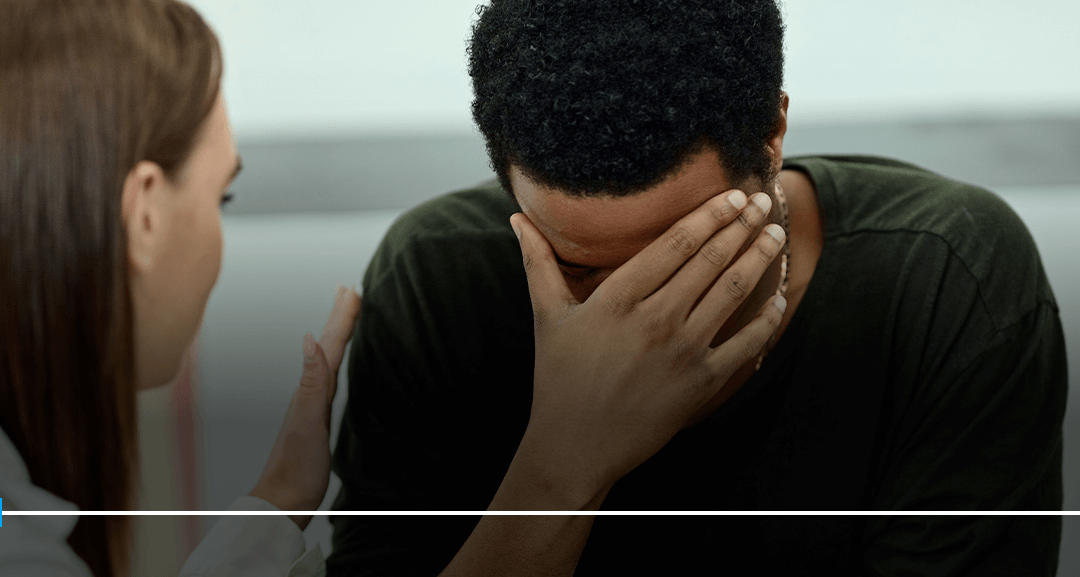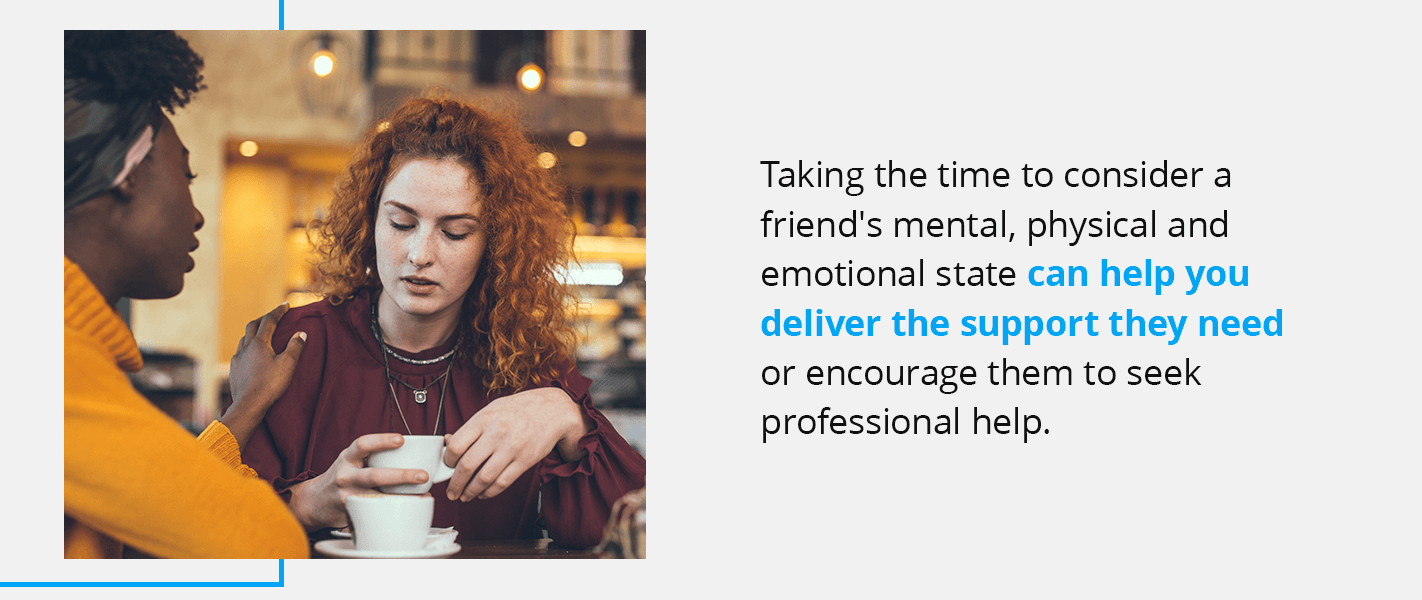It can be challenging to balance life and school. Extracurricular activities, homework, after-school jobs, relationships, and family commitments can quickly pile up, creating a stressful environment that can become overwhelming. When significant life changes — like a breakup, losing a loved one or questioning an identity — arise, the sadness, anxiety, or stress can feel unmanageable.
Identifying the signs someone is struggling isn’t always easy, but there are several things you can look for and many ways to show your support. Discover how to know if your friend is depressed and other signs they need help.
What Are the Signs of Depression?
Depression can appear different for everyone, and many struggle to understand these feelings and symptoms. It causes persistent feelings of loss of interest and sadness and significantly affects your mood. Symptoms are often severe enough to affect many facets of life, including relationships, social activities, work, and school. Mentally unstable signs could include:
- Fixating on self-blame or past failures.
- Trouble concentrating.
- Feelings of hopelessness, sadness, or emptiness.
- Loss of pleasure in everyday activities.
- Angry outbursts over large and small matters.
- Sleep disturbances.
- Slowed body movements, speaking, or thinking.
- Recurring or frequent thoughts of death.
- Unexplainable physical concerns such as headaches or back pain.
Signs Someone Needs Help
Although many signs of needing help may be internal, depression and anxiety symptoms often show in other areas of life. Taking the time to consider a friend’s mental, physical, and emotional state can help you deliver the support they need or encourage them to seek professional help. If you feel your friend hasn’t been acting like themselves lately, it can be helpful to recognize some of these behaviors and signs:
1. Physical Changes
Sudden physical changes can indicate a significant problem. For example, rapidly losing weight could suggest your friend isn’t eating. You may also notice dark circles under their eyes, indicating that they haven’t been sleeping well. Additional changes, such as no longer caring for hygiene, are also concerning. If you notice any of these sudden changes, express your concern to your friend.
2. Mood Swings
Emotional outbursts are common for people battling depression and anxiety. Abnormal behaviors like crying regularly or getting angry over small criticisms could be cause for concern. Irritability is a core symptom of depression among adolescents and children, and one study shows that more than half of those with major depression experience over-anger or over-irritability.
3. Withdrawing From Activities or People
Withdrawing is another common sign to watch for. You may notice that your friend consistently finds ways to avoid socializing or showing a lack of interest in activities they typically enjoy. This can also affect other areas of life. You may notice your friend absent from sports practices, missing days at school, calling off from work, or showing up late.
4. Negative Self-Talk
Self-talk can impact relationships and mental health. Consistent negative thoughts result in feeling bad most of the time, and many people who experience negative self-talk face anxiety or depression. The constant negativity can be overwhelming and challenging to break away from, creating a harmful cycle. Listen for these warning signs:
- “I’m worthless.”
- “I ruin everything.”
- “I always let people down.”
- “I don’t want to wake up.”
- “What’s the point?”
- “I hate the way I look.”
- “Everything is my fault.”
- “I don’t feel well.”
5. Concerning Social Media Posts
Some people view social media as an escape from the world and find it easier to voice their thoughts and feelings in less apparent ways. Monitor your friend’s comments and posts for negative thoughts or harmful shares. Disturbing videos or songs, dark quotes, intense poetry, and worrisome hashtags could indicate that your friend is facing a mental health challenge.
6. Anxious Behaviors
Stress and anxiety can cause picking behaviors such as biting fingernails, peeling skin, or twisting hair. Although these behaviors can result from boredom for some people, you may notice new or worsening behaviors for people with anxiety or depression. Without treatment, severe picking can become uncomfortable or painful and may have lasting effects.
7. Hoarding Security Items
Stacking items could be a subtle sign that your friend is struggling emotionally. Hoarding can be a coping mechanism for stressful or traumatic events. If your friend is gathering books, clothing or other sentimental items, they could be looking for a sense of control or security.
8. Decline in Performance
A more obvious sign a friend needs help may be declining performance. This could involve submitting subpar school work, neglecting to complete assignments, missing practices, calling off from work or being late to important events and responsibilities. Learning to balance life and college or school can be challenging, but you should encourage your friend to find healthy ways to handle the stress.
9. Unhealthy Coping Mechanisms
People often try to find coping mechanisms when facing daily challenges, but some — like excessive drinking or smoking — are unhealthy for the mind and body. Creating a coping mechanism based on these unhealthy habits can have long-term implications for one’s overall well-being. If your friend has picked up an unhealthy habit or started participating in it to excess, it’s time to seek help.
10. Changing Eating Habits
Eating too much or too little can be a sign of emotional challenges. Your friend may be restricting how much they eat because they are concerned about how they look or lose their appetite because they’ve lost interest and energy after a traumatic event. They could also binge eat when they feel low, leading to an unhealthy relationship with food.
How to Help a Friend Who Is Struggling
When you notice a friend struggling, it’s natural to want to help in any way you can. Thankfully, there are many ways to express your love through small and large actions. The best ways to show support for a struggling friend is to:
- Encourage them to seek professional help.
- Empower to reframe negative thoughts.
- Let them talk when they want to, rather than forcing them and telling them you are happy to listen to anything they have to say.
- Continue inviting them to events and make an effort to let them choose some activities.
- Send photos, videos, memes and other items that remind you of them.
- Respect their boundaries.
- Offer hugs to friends who love the warm, comforting support.
- Discuss mental health services that can help.
- Check in by meeting up in person or via message or phone call.
- Be patient while they navigate their emotions.
- Encourage meaningful self-care practices.
Find Support at Merrimack Valley Psychological Associates
Merrimack Valley Psychological Associates understands that life can become overwhelming. Although support from friends and family can go a long way on the road to recovery, sometimes professional help is the best option. Everyday anxieties can quickly become overwhelming, and we help individuals achieve their unique goals for their well-being.
We offer comprehensive services to treat anxiety, depression, loss, and stress. If you think your friend is struggling, encourage them to find professional support from our caring and dedicated team.
Questions about starting therapy? Head over to our Frequently Asked Questions page for all the details you need. Contact us for more information about our services or to learn how we can help.



